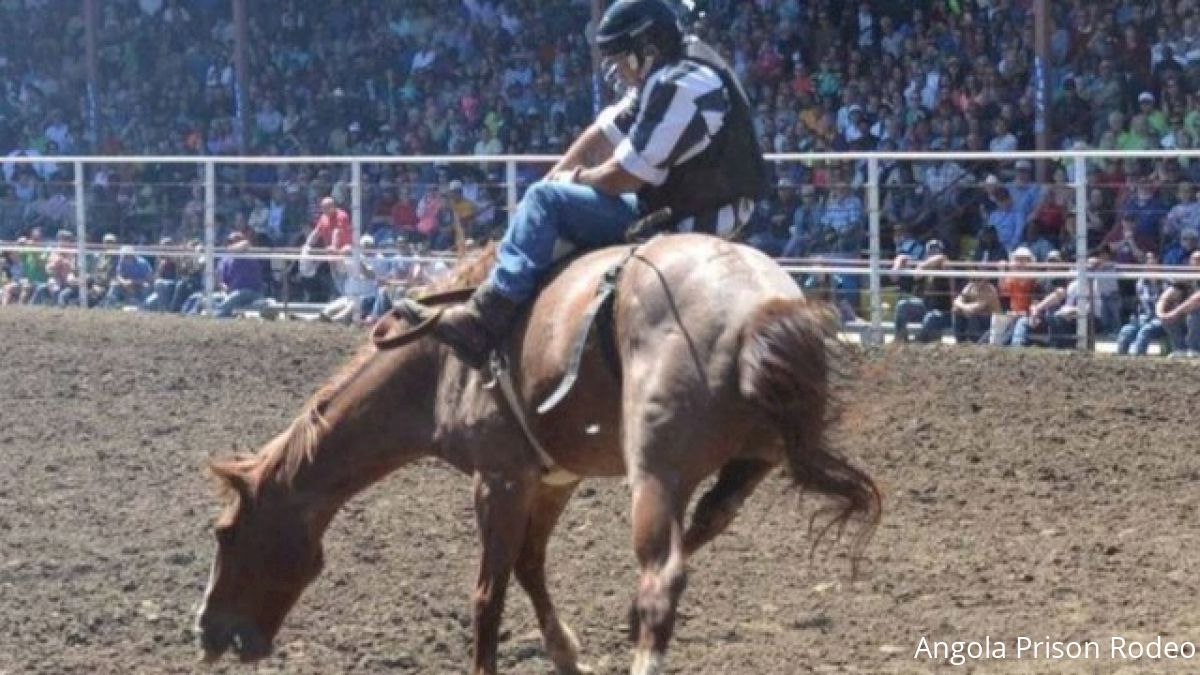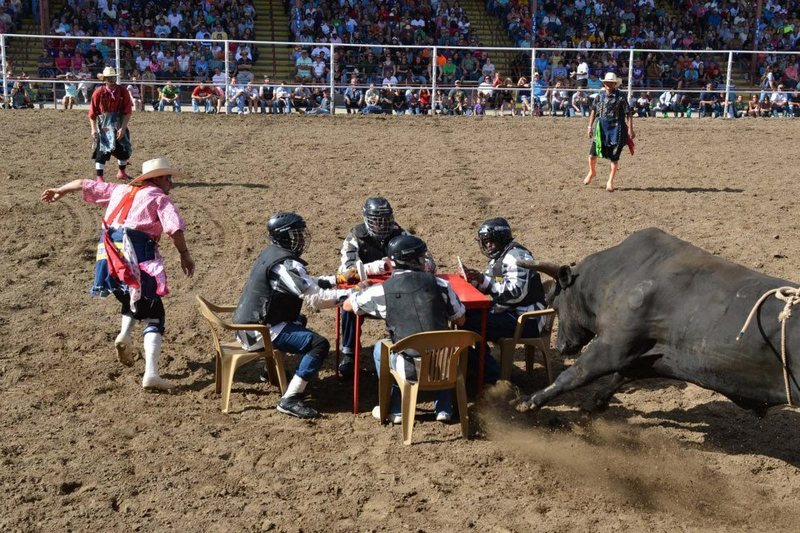Inmates Buck The Bars At Angola Prison Rodeo
Inmates Buck The Bars At Angola Prison Rodeo
Every Sunday in October, inmates at the Louisiana State Penitentiary get to saddle up and become cowboys for a day at the Angola Prison Rodeo.

Every Sunday in October, inmates at the Louisiana State Penitentiary get to saddle up and become cowboys for a day.
The Angola Prison Rodeo kicked off its fall 2016 slate last weekend, and like most other years, the 10,000-seat arena at the prison complex was packed with attendees from in and out of state. The concept isn’t novel—Texas and Oklahoma also host prison rodeos—but Angola is the nation’s oldest.
What started as a modest recreational activity for inmates and employees in 1965 bloomed into a beloved tradition for spectators and a viable source of supplemental income for the largest maximum-security prison in the nation. Attendees pay $20 each for a ticket, and also have the option to purchase original work created by the inmates at the hobbycraft fair held alongside the rodeo.
The proceeds, which usually amount to $450,000 for a single show, cover the rodeo expenses and enhance inmate educational and recreational activities and supplies through the Louisiana State Penitentiary Inmate Welfare Fund.
But the intangible benefits are just as important. Among the 6,300 prisoners, the average sentence is 93 years, and 75 percent of the offenders will be there for life, according to a 2013 report by the Times Picayune. For many of the inmates, the prison rodeo is the highlight of their year—a chance to escape the daily routine of their lives at the penitentiary. Douglas Whitton, an inmate at Angola, told the Times Picayune that the event’s real benefit is the sense of freedom it lends the inmates.
In addition to the traditional rodeo events, such as bareback riding and roping, the Angola Prison Rodeo puts its own spin on a few categories. For “Convict Poker,” four inmates sit at a table in the center of the arena while a bull runs loose—the last man sitting wins.

"Convict Poker" at the Angola Prison Rodeo in 2014. Credit: Angola Prison Rodeo
Other than when they participate in the rodeo, the inmates don't practice, and most have little to no experience in any of the events. That's why a fleet of emergency medical professionals are always close at hand. Fortunately, there haven't been any deaths since the Angola Prison Rodeo began 51 years ago, but there certainly have been injuries. One inmate, Alex Hennis, has sustained "a broken eye socket, broken nose, broken leg, broken hand, strained shoulder and 14 concussions," according to USA Today.
The rodeo also functions as an incentive for good behavior at Angola—only orderly inmates are allowed to participate, and event-winners earn prize money. The final event, "Guts and Glory," provides $300 to the inmate who can snatch a poker chip off the horn of a nearly 2,000-pound bull.
In an interview with USA Today, inmate Michael Fasola said described his rodeo experiences at Angola as incredible: "All those people watching, cheering you on. It's like time stops. You feel free for a day."
The Angola Prison Rodeo kicked off its fall 2016 slate last weekend, and like most other years, the 10,000-seat arena at the prison complex was packed with attendees from in and out of state. The concept isn’t novel—Texas and Oklahoma also host prison rodeos—but Angola is the nation’s oldest.
What started as a modest recreational activity for inmates and employees in 1965 bloomed into a beloved tradition for spectators and a viable source of supplemental income for the largest maximum-security prison in the nation. Attendees pay $20 each for a ticket, and also have the option to purchase original work created by the inmates at the hobbycraft fair held alongside the rodeo.
The proceeds, which usually amount to $450,000 for a single show, cover the rodeo expenses and enhance inmate educational and recreational activities and supplies through the Louisiana State Penitentiary Inmate Welfare Fund.
But the intangible benefits are just as important. Among the 6,300 prisoners, the average sentence is 93 years, and 75 percent of the offenders will be there for life, according to a 2013 report by the Times Picayune. For many of the inmates, the prison rodeo is the highlight of their year—a chance to escape the daily routine of their lives at the penitentiary. Douglas Whitton, an inmate at Angola, told the Times Picayune that the event’s real benefit is the sense of freedom it lends the inmates.
In addition to the traditional rodeo events, such as bareback riding and roping, the Angola Prison Rodeo puts its own spin on a few categories. For “Convict Poker,” four inmates sit at a table in the center of the arena while a bull runs loose—the last man sitting wins.

"Convict Poker" at the Angola Prison Rodeo in 2014. Credit: Angola Prison Rodeo
Other than when they participate in the rodeo, the inmates don't practice, and most have little to no experience in any of the events. That's why a fleet of emergency medical professionals are always close at hand. Fortunately, there haven't been any deaths since the Angola Prison Rodeo began 51 years ago, but there certainly have been injuries. One inmate, Alex Hennis, has sustained "a broken eye socket, broken nose, broken leg, broken hand, strained shoulder and 14 concussions," according to USA Today.
The rodeo also functions as an incentive for good behavior at Angola—only orderly inmates are allowed to participate, and event-winners earn prize money. The final event, "Guts and Glory," provides $300 to the inmate who can snatch a poker chip off the horn of a nearly 2,000-pound bull.
In an interview with USA Today, inmate Michael Fasola said described his rodeo experiences at Angola as incredible: "All those people watching, cheering you on. It's like time stops. You feel free for a day."